
Naming every expedition participant in a telepresence-enabled mission is next to impossible! Many from dozens of institutions across the country have provided input into the expedition plan and are expected to participate. However, we've assembled information about the members of the science and remotely operated vehicle teams who are physically onboard NOAA Ship Okeanos Explorer, and whose voices you are likely to hear most often when watching the live video.
And of course, none of this exploration would be possible without the work of the dedicated NOAA Commissioned Officer Corps and civilians who operate NOAA Ship Okeanos Explorer as part of NOAA's fleet managed by NOAA's Office of Marine and Aviation.
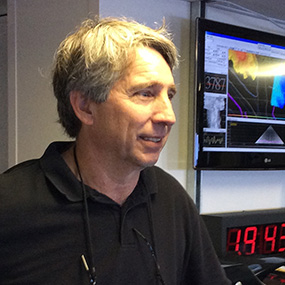
Co-science Lead
University of Hawaii
Dr. Christopher Kelley is serving as the science lead for the three-year CAPSTONE project in the Pacific. He has been the program biologist for the Hawaii Undersea Research Laboratory (HURL) at the University of Hawaii for the last 17 years. His core responsibilities have included the identification of deepwater fish and invertebrates recorded during submersible and remotely operated vehicle (ROV) operations and the extraction of video annotations for inclusion in HURL’s deepwater animal database and online photo guide. Chris is also graduate faculty for the Department of Oceanography, serving on both masters and PhD graduate student committees.
In addition to his core responsibilities, Chris has both the lead for and worked on numerous external grants from federal and state agencies. Some projects have focused on the deepwater bottomfish fishery, involving the review of Essential Fish Habitat (EFH) designations in Hawaii and elsewhere in the Pacific; examining the impacts of bottom fishing; and evaluating the effectiveness of bottomfish reserves. Other projects have involved the description of the deepwater communities living on manganese crusts in the Central Pacific and describing the deepwater biological communities associated with disposed munitions off Pearl Harbor. Chris has also lead a significant number of multibeam and sidescan sonar mapping projects throughout the Hawaiian archipelago, the latest of which involved 72 days of mapping in the Papahanaumokuakea Marine National Monument on board the R/V Falkor. His sidescan sonar towfish surveys off Oahu have led to the discovery of a number of submerged cultural resources, the most significant of which was the Japanese mini sub sunk by the U.S. destroyer Ward moments before the 1941 attack on Pearl Harbor. He has been contracted to create various types of GIS projects and recently completed the first multibeam backscatter synthesis of the entire seafloor surrounding the Main Hawaiian Islands.
Dr. Kelley received his PhD in 1995 from the University of Hawaii while researching fish reproductive cycles. Prior to joining HURL, he traveled extensively, providing technical assistance for developing fish hatcheries in Indonesia, Taiwan, the Philippines, Egypt, and Cameroon, West Africa. He was also an aquanaut for the Hydrolab Undersea Habitat in 1982, assisting in a study on the ecology and social behavior of Caribbean angelfishes.
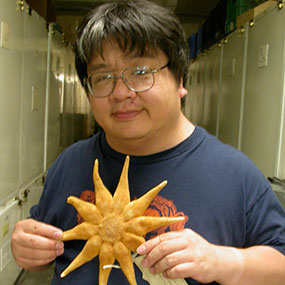
Co-science Lead
National Museum of Natural History, Smithsonian Institution
Chris Mah studies the biology, evolution, and diversity of sea stars (also called starfish or asteroids). This includes identifying and describing new species, understanding their relationships to other starfishes, and studying adaptations of starfish species to their environment, especially those in the deep sea. He has described over 30 new species, including half a dozen new genera and a new family of deep-sea starfishes. He is broadly knowledgeable about echinoderms (spiny skinned relatives of sea stars) and many other deep-sea animals.
Dr. Mah has studied sea stars throughout the world, including Japan, Australia, New Zealand, Antarctica, and South Africa. Deep-sea research is also one of his primary research topics and his studies have taken him on two submersible dives (Atlantic and Pacific) as well as research cruises in the North Pacific and the Atlantic.
Although he has participated in Okeanos Explorer cruises as a shoreside expert, this will be his first time onboard as a biology co-lead.
He has a BS in Zoology from Humboldt State University, a Masters in Marine Biology from San Francisco State University (in cooperation with the California Academy of Sciences), and a PhD in Geology (Paleontology) from the University of Illinois at Urbana-Champaign. Chris grew up as a ‘natural history nerd’ looking for beetles and salamanders in his home town of San Francisco, California, eventually finding like-minded folk at the California Academy of Sciences and other natural history museums. This and a healthy diet of science fiction movies and comic books has let to his infatuation with studying the weird evolutionary adaptations of some of the strangest animals on the planet.
Chris writes the Echinoblog (http://echinoblog.blogspot.com/ ), a blog about echinoderms (sea stars, sea urchins and their relatives) and other strange invertebrates. He tweets about these things on Twitter: @echinoblog .
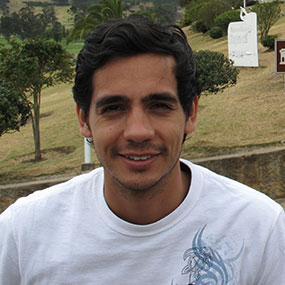
Global Foundation for Ocean Exploration
Fernando graduated from the University of Hawaii at Manoa with a B.S. in Mechanical Engineering. During his studies, he had experience in several fields including conceptual design, aerospace research, mechanical design, robotics and software development. From these activities he was able to intern for NASA at the Jet Propulsion Laboratory, present research in a national conference, and even coauthor a technical paper in the Journal of the Astronautical Sciences. His most recent position was at the Field Robotics Laboratory (FRL) where he helped support operations, testing and software development for two unmanned surface vehicles. From his time in FRL, he discovered a true passion for development and design of robotic systems. Originally from Colombia, Fernando enjoys outdoor activities and currently resides in State College, Pennsylvania.
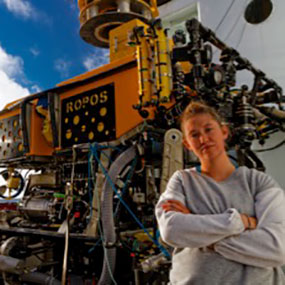
Hydrographer and Marine Geologist
Neah Baechler is a contract Hydrographer and Marine Geologist dedicated to exploring the depths of our planet’s most elusive ecosystem: the ocean. She began her career at the College of Charleston in South Carolina as a Benthic Acoustic Mapping and Sonar (BEAMS) program student, honing her skills in seafloor mapping. Through the BEAMS program, Neah had the opportunity to sail on multiple research expeditions with NOAA, the University of Washington, and with hydrographic firms in the private sector. These experiences jump started her love for ocean research and time spent at sea. Since earning her Bachelor of Science in 2015, Neah has dedicated herself to exploration and discovery, traveling and mapping the seafloor in far reaching locations. Her passion for research expeditions has only grown, and she plans to further her sub-surface study in a graduate program focused around temperature-driven ocean circulation and its effects on climate. Neah hopes to spread her enthusiasm for all things marine through outreach and documentary filmmaking, educating people about the widespread impacts our ocean has on our daily life.
Outside of hydrography, time well spent for Neah is hiking, camping or reading in a quiet corner of her Portland, Oregon home.
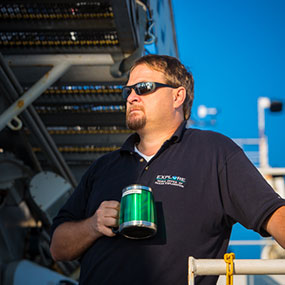
Electronic Systems Engineer
Global Foundation for Ocean Exploration
Roland Brian brings 29 years of experience and a keen eye for precision HD video to the program as a video/satellite and telepresence engineer. Roland began his career in the U.S. Air Force where he worked as a Satellite Communications Engineering Technician with visions of working on the U.S. Space Station. He traded in that quest for one of deep-ocean exploration and sharing beautiful imagery with the world. He has worked with the NOAA Office of Ocean Exploration and Research (OER) and the Okeanos Explorer Program since 2009 and has been engaged in every telepresence-enabled remotely operated vehicle (ROV) expedition. He has also provided services for other projects using OER’s mobile telepresence system, including the 2012 Ring of Fire Expedition. His duties aboard NOAA Ship Okeanos Explorer include operation and maintenance of the ship's Telepresence and video systems, including on ROV Deep Discoverer and the Seirios camera platform. Again, Roland’s experience embodies the breadth and depth of knowledge the OER program encourages. When not fine-tuning the video and telepresence systems or training and mentoring new team members, he's actively involved in the editing process of our ever-expanding ocean exploration video library. While not at sea, Roland enjoys life with his wife and family in sunny Sarasota, Florida.
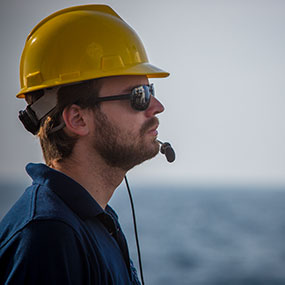
Mechanical Engineer
Global Foundation for Ocean Exploration
Joshua Carlson attended the University of Massachusetts, Dartmouth, where he received a B.S. in Mechanical Engineering with minor in Business Administration. He went on to receive his M.S. in Marine Observation Technology from the University of Massachusetts, Dartmouth School for Marine Science and Technology. Josh has a diverse background, encompassing the use of autonomous underwater vehicles (AUVs) and other types of ocean observation platforms for the purpose of studying ocean turbulence. He has designed and built a deep-ocean camera platform for filming deep-water krill in the Antarctic Ocean and provided mechanical engineering and software capabilities on the Woods Hole Oceanographic AUV Sentry during a recent cruise aboard the NOAA ship Okeanos Explorer. In his current position with NOAA’s Ocean Exploration program, Josh provides engineering, programming, and at-sea support, acting in the capacity of navigator, pilot, and co-pilot for NOAA’s 6000-meter-rated remotely operated vehicle system, Deep Discoverer. His broad range of skills in both engineering and software control development makes him an invaluable member of our team. When not traveling, Josh resides in Fairhaven, Massachusetts.
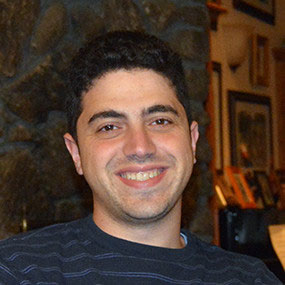
Electrical Engineer
Global Foundation for Ocean Exploration
David Casagrande holds a B.S. and M.S. in Ocean Engineering from the University of Rhode Island, completing his masters in 2013 with a focus on robotic instrumentation and computer vision. As a student, he worked on an autonomous profiling and imaging platform used for fisheries habitat assessments and counts. Since graduating, he has worked on a range of autonomous profiling and surface vehicles, measuring chemical and physical properties of the water, sonar mapping, and sea floor imaging. He has sailed on a number of research cruises to support and operate these vehicles. David also worked on underwater stereo camera systems, both standalone and ROV-based. Improving the calibration of these camera systems, required for accurate 3D reconstruction and measurements, continues to be an interest.
When not at sea, he lives in South Kingstown, Rhode Island.
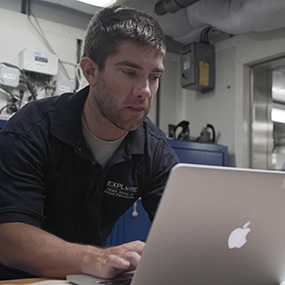
Marine Scientist
Matt Dornback brings a background of marine science, data management, and outreach to the NOAA National Centers for Environmental Information. Currently he works with the Deep-Sea Coral Research and Technology Program to manage their data and make it available to the public through deepseacoraldata.noaa.gov. He holds a B.S. in Marine Biology from the University of North Carolina Wilmington and a M.S. in Biological Oceanography from the University of Southern Mississippi Department of Marine Science. During cruises, Matt manages the data collected from samples collected by the ROV and works with the Science Leads to properly handle and preserve the specimens for further scientific analysis.
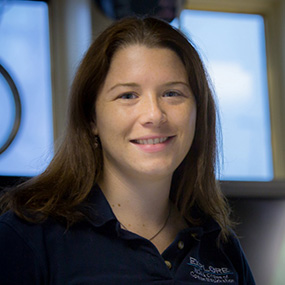
Expedition Manager
NOAA Office of Ocean Exploration and Research
Kelley Elliott is the Senior Expedition Manager for the NOAA Office of Ocean Exploration and Research’s telepresence-enabled exploration program. She holds a Master’s degree in Maritime Archaeology from the University of Southampton and a Bachelor’s degree in Environmental Conservation from New Century College, George Mason University. Kelley has been planning, coordinating, and managing expeditions conducted by NOAA Ship Okeanos Explorer since joining the operation in 2009. In this role, she acts as a liaison for science and operational partners onshore as well as coordinating the mission planning process between all personnel onboard the ship.
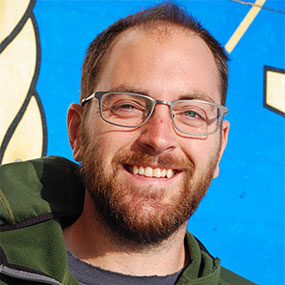
Research Scientist
Center for Coastal and Ocean Mapping/Joint Hydrographic Center at the University of New Hampshire
Kevin Jerram is a Research Scientist with the Center for Coastal and Ocean Mapping / Joint Hydrographic Center at the University of New Hampshire (UNH). His first experience aboard the Okeanos Explorer was an expedition to acoustically detect and characterize methane seeps in the Gulf of Mexico in 2011, forming the basis for his M.S. thesis in Ocean Engineering at UNH. Kevin has since been involved in 20+ seafloor and midwater mapping expeditions in the Atlantic, Pacific, and Arctic Oceans aboard a variety of U.S. and international vessels. With the National Science Foundation-funded Multibeam Advisory Committee, he supports echosounder system integrations and independent evaluations to enhance multibeam data quality across the U.S. academic fleet.
Kevin was initially drawn to ocean mapping because it blends engineering with exploration. He greatly enjoys supporting the ROV team’s amazing work by producing up-to-date, high-resolution bathymetric surfaces for the pilots and scientists to use during their dives. When back on land, Kevin can be found hiking with his wife and foster dog(s) in the mountains of Vermont and working on their good old sailboat.
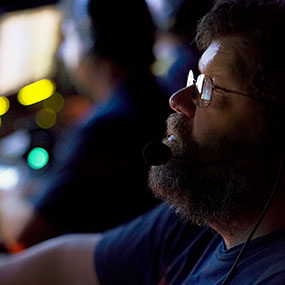
Global Foundation for Ocean Exploration
Bob has almost 50 years’ experience in broadcast engineering. Following a 37-year career with RIPBS, departing in 2006 as Chief Engineer, he worked for the Sea Research Foundation and Ocean Exploration Trust as the Senior Broadcast Engineer. He was responsible for the design, commissioning, and maintenance of the Inner Space Center located at the University of Rhode Island Graduate School of Oceanography. He also worked on many research vessels and supported telepresence operations from NOAA Ship Okeanos Explorer, E/V Nautilus, R/V Endeavor, and R/V Atlantis, plus many other UNOLS ships.
Bob is married and has six adult children, nine grandchildren, and a great-grandson. He and his wife Donna play French horn and are active in many community music ensembles in Rhode Island.
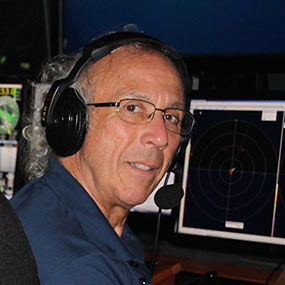
Global Foundation for Ocean Exploration
Don Liberatore has more than 35 years of experience in manned and unmanned submersible operations as a diver-medic, mixed gas lock-out diver and hyperbaric chamber operator and Chief Submersible Pilot for Harbor Branch Oceanographic Institution’s Johnson-Sea-Link I & II research submersibles. He has logged nearly 1,800 dives as a pilot, hundreds more as a pilot-trainer, and over 200 as a mixed gas lock-out diver to 350 feet.
In addition to science missions, he has participated in recovery operations as Submersible Operations Coordinator. These include the search and recovery of the Space Shuttle Challenger, excavation and documentation of the U.S.S. Monitor, documentation of the wreck of the S.S. Edmund Fitzgerald, and the search for the wreckage of Amelia Earhart’s plane in the central Pacific Ocean using two REMUS 6,000 meters autonomous underwater vehicles.
He has worked as crew member and/or project manager for the Kraken (UCONN), Mohawk (UNCW) and Global Explorer (DSSI/Oceaneering Int.) ROVs. He is participating in this expedition as a member of the Deep Discoverer crew.

Mechanical Engineer
Global Foundation for Ocean Exploration
Andy earned a Bachelor's in Ocean Engineering from Texas A&M. He then obtained a Master's in Mechanical Engineering focusing on Robotic Artificial Intelligence and Systems Engineering from Embry Riddle in Daytona Beach. After college, he lent his knowledge to the oilfield service industry for four years, living in various places including Wyoming, North Dakota, and Alaska while on assignment. Recently, he has come back to the mechanical and software side of engineering to contribute to the team at the Global Foundation for Ocean Exploration. He loves traveling, exploring, and being outdoors.
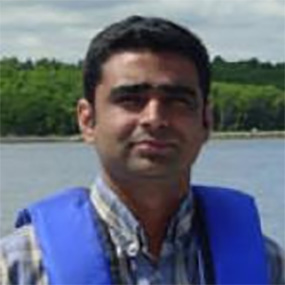
Physical Scientist/Hydrographer
NOAA Office of Ocean Exploration and Research
Mashkoor earned his master's in Ocean Mapping from the University of New Hampshire in 2005. He has been with NOAA since 2008 and served as the onboard mapping lead on the Okeanos Explorer from 2008-2013. From 2013-2015, he worked with the NOAA Office of Coast Survey. He rejoined OER in July 2015 as a Mapping Team Lead, where he is responsible for the ocean mapping systems onboard NOAA Ship Okeanos Explorer. On shore, Mashkoor works in Silver Spring, Maryland, where he contributes to expeditions through data processing and archiving, operational planning, and mapping product development.
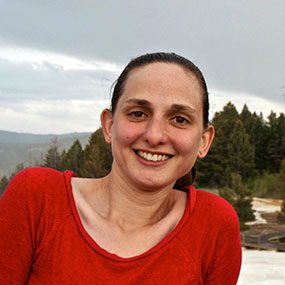
Video Producer
Global Foundation for Ocean Exploration
Emily Narrow is a video producer and editor whose work focuses on science and nature. She earned a Bachelor of Arts degree from Oberlin College where she double-majored in Biology and Cinema Studies. She also holds an MFA degree in Science and Natural History Filmmaking from Montana State University. She was a video producer for a production company in Washington, D.C. for three years, where she made public service announcements, ad campaigns, and promotional videos for non-profit and environmental organizations. Since 2010, she has been a freelance video producer, creating videos for clients such as the National Park Service, NOAA, and Montana State University. Most recently, she produced and edited a series of educational videos about camping and hunting for Zero Point Zero Productions. Emily first started sailing onboard the Okeanos Explorer in July 2016, and has since sailed on nearly half a dozen expeditions. Emily currently resides in Bozeman, Montana.
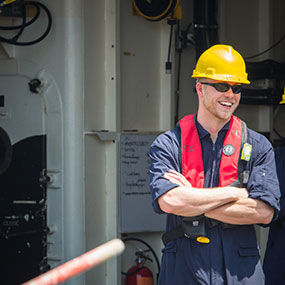
Ocean Engineer
Chris first joined our group on the Cayman Rise Expedition in 2011, just prior to being hired full time by NAVSEA. Since then, an informal NAVSEA-NOAA relationship has allowed Chris to continue to participate in our design, engineering, and offshore operations. Chris holds a B.S. in Ocean Engineering and a B.S. in Aerospace Engineering from Virginia Tech with a minor in mathematics. He is currently working on his M.S. in Ocean Engineering at Virginia Tech and expects to complete that program in 2015. Chris has been a major contributor to our design-build process and a tremendous asset to our offshore operations. He is a skilled navigator, pilot, and co-pilot of our vehicles and brings with him a level of enthusiasm that everyone around him appreciates and respects. The Office of Ocean Exploration and Research is very lucky to have his participation and we applaud NAVSEA for their insight, training, and willingness to share great talent. Chris resides in Arlington, Virginia.
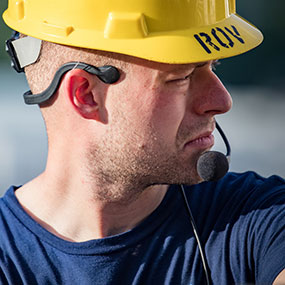
ROV Engineer
Global Foundation for Ocean Exploration
Dan Rogers has a diverse background in engineering, media production, and education. Daniel holds a B.S. in Physics and earned a M.S. in Mechanical Engineering from the University of Hawaii in 2013. Before starting his graduate program, Daniel worked as a Science Educator at the Bishop Museum in Honolulu. He continued to work with the museum as a Digital Media Producer while in school, partnering with the Polynesian Voyaging Society to produce a 30-minute film about traditional sailing and star navigation for the fulldome planetarium format. He has now been working as an ROV engineer and videographer on the Okeanos Explorer for over four years.
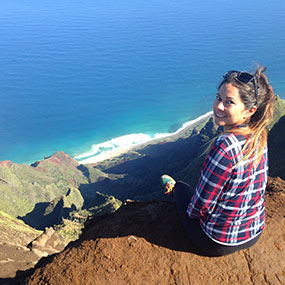
NOAA Educational Partnership Program Intern
NOAA Office of Ocean Exploration and Research
Nikola Rodriguez is a NOAA Educational Partnership Program intern; she will be working on video annotation post-dive analysis with Mashkoor Malik. She is an undergraduate at the University of Hawaiʻi at Hilo, where she is pursuing a B.S. in Marine Science with a minor in Chemistry, a Marine Option Program (MOP) Certificate, and a Hawaiian Culture Certificate. As a turtle responder with the Marine Fisheries department on the Hawaiian Green Sea Turtle response team, Nikola helps stranded, sick, and injured sea turtles. She also assists with educating the community on the importance of protecting the Hawaiian Green Sea Turtle. Her main interests are in coral reef health and underwater ecological surveying. Nikola is an AAUS scientific diver for the University of Hawaiʻi and recently completed the two-week Quantitative Underwater Ecological Surveying Techniques (QUEST) field course at Kealakekua Bay on the island of Hawaiʻi. QUEST provides science divers with extensive training in survey techniques used by agencies worldwide. Her future plans are to live in Hawaiʻi and work for NOAA as a science diver conducting benthic health research at the Papahānaumokuākea Marine National Monument.
Outside of school, Nikola enjoys freediving, surfing, and hiking into the hard-to-reach places around Hawaiʻi.
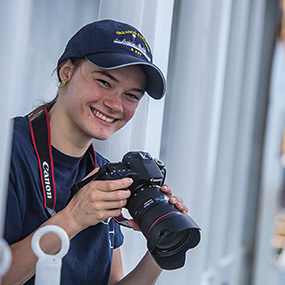
Producer
Global Foundation for Ocean Exploration
Tara Smithee has been sailing on Okeanos Explorer expeditions since 2012 as a producer, editor, and ROV camera operator. She holds a Masters in Ocean Systems from Stanford University and is pursuing a second Masters in Science and Natural History Filmmaking from Montana State University. Tara has a tremendous interest in science and exploration and amazement for the natural world. She is an avid scuba diver and one of her most treasured marine memories was swimming with dolphins in the wild. When not at sea, she enjoys dancing and writing in Portland, Oregon.
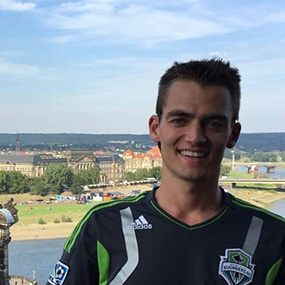
ROV Engineer
Global Foundation for Ocean Exploration
Levi Unema is an Eagle Scout from Lynden, Washington. He holds a B.S. in Electrical Engineering along with a Certificate in Electric Power Engineering from Michigan Technological University. Levi has experience in a number of different industries, ranging from the railroad, to steel mills, to automotive supplier light manufacturing. Currently living in west Michigan, he enjoys being outdoors and staying active.
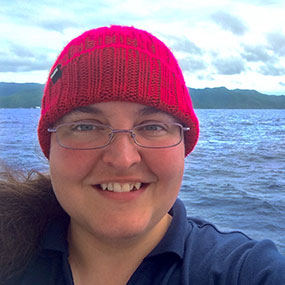
Video Producer
Global Foundation for Ocean Exploration
Annie White is an award-winning documentary filmmaker, photographer, and biologist who specializes in conservation biology and animal behavior. She holds a B.A. in Environmental, Population and Organismic Biology from the University of Colorado, and is currently finishing an MFA degree in Science and Natural History Filmmaking at Montana State University. Her career has taken her from collecting dinosaur fossils, to studying wild wolves, to filming cougars, grizzly bears, and now, deep-sea creatures. The years she spent living and traveling with captive ambassador wolves kick-started Annie’s interest in science education and inspired her to reach out to larger audiences through film. Her credits include projects for NOAA, BBC, National Geographic WILD, Travel Channel, Curiosity Stream, and various non-profit groups. In all of her work, Annie endeavors to bring together science, wildlife conservation, and compelling narratives to spark wonder and draw audiences into the lives of real animals. When not at sea, Annie loves to travel, write, and look for any excuse to get out into the natural world.
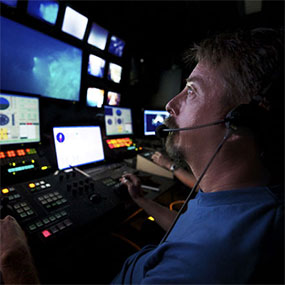
ROV Pilot / Electrical Graybeard
Global Foundation for Ocean Exploration
Dave Wright joined the Ocean Exploration Program in 2009 to help bring to life the ROV component aboard the Okeanos Explorer. He is a self-taught engineer who brought a set of skills that most would envy. Highly respected in the field of underwater technology, Dave spent a decade working with Dr. Robert Ballard at the Institute for Exploration. Prior to that he was a development engineer at the Monterey Bay Aquarium Research Institute.
Dave is one of our senior pilots and, in addition to being an invaluable electrical engineer, he is one of our most respected mentors to the younger generation we seek to train. Dave is a veteran of some of the earlier ocean exploration projects, having served as pilot on the 2004 Titanic cruise, the 2004 and 2005 Mountains in the Sea cruises, and the 2005 cruise to Lost City. He is a co-inventor of the ‘Aquatic Autosampler,’ a fully automated system for in situ species identification of toxic phytoplankton, developed at the Monterey Bay Aquarium Research Institute. When not on assignment with Ocean Exploration, Dave enjoys exploring the brownwaters of the Ohio River near Louisville in ‘Kitty Hawk’, a 1941 mahogany-on-oak motor cruiser.